Choosing the right size wall art for your space transforms a room. It’s not just about aesthetics; it’s about balance and harmony. Too small, and it gets lost. Too large, and it overwhelms. In this post, we’ll explore key points to consider when selecting the size of an artwork. Let’s explore how to choose the right size wall art for your living space without the common pitfalls.
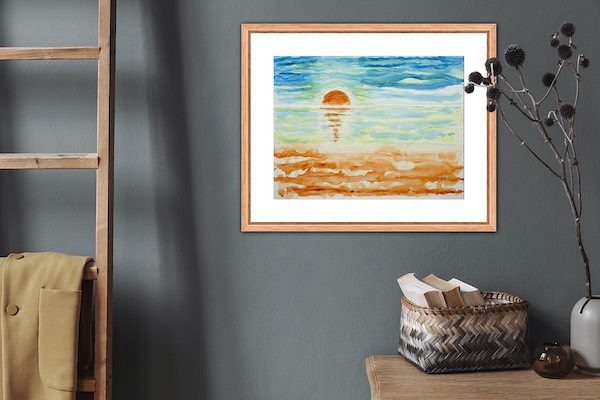
Understanding Your Space for the Right Size Wall Art
Measure Your Walls

Before selecting art, accurate measurements are vital. Use a measuring tape and level to ensure straight placements. Common wall sizes vary by room:
- Living Room: 12×16 feet
- Bedroom: 10×12 feet
- Dining Room: 10×14 feet
Knowing your dimensions helps narrow down your options.
Considering Wall Height and Width
Think about how art relates to your wall space. Maintain a balanced ratio. A general guideline is to occupy 50-75% of the wall’s width. Also, consider your ceiling height—higher ceilings allow for taller artwork, while lower ceilings favor wider pieces creating an illusion of space.
Analyzing Existing Furniture and Decor
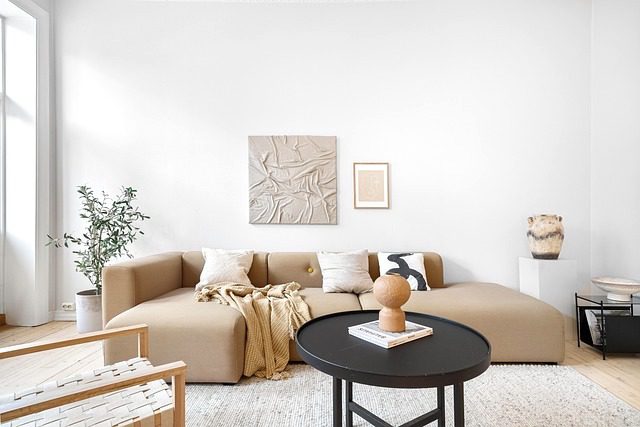
Furniture placement affects art size. For instance, large sofas demand substantial art pieces to avoid feeling disconnected. Use art to create balance with existing decor; a large painting might complement a sleek sectional or soften a room filled with angular furniture.
How to Choose the Right Size Wall Art
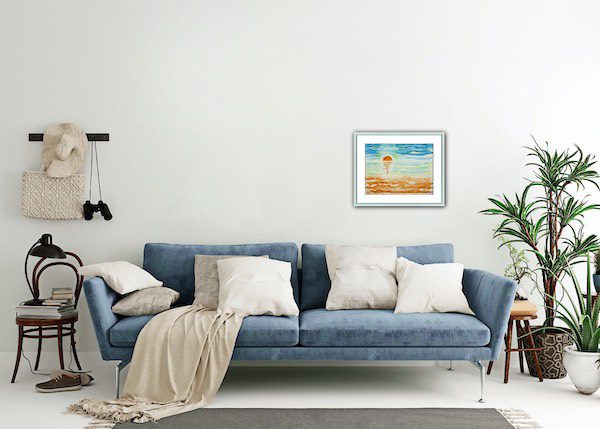
The Rule of Thirds in Art Placement
Using the rule of thirds enhances your arrangement. Imagine dividing your wall into three equal parts. Placing art at the intersection points creates natural focal points. Many artworks use this concept in composition, creating visual harmony and balance.
The ‘Eye Level’ Principle
Place your artwork at eye level for optimal viewing. The center of the piece should be about 56-60 inches from the floor. This ensures that viewers appreciate the art without straining.
Consider the Style of Art
Art style affects its perceived size. Abstract pieces might seem larger due to their bold colors and forms, while realistic art may feel smaller. Don’t overlook the frame; a thick frame makes a smaller piece seem larger, while a delicate frame shrinks a bigger artwork’s presence.
Exploring Different Art Formats for the Right Size Wall Art
Single Large Artwork
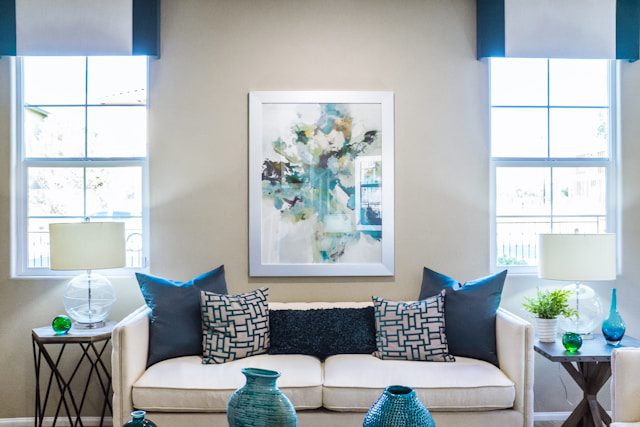
Large art pieces, like murals or tapestries, serve as the room’s focal point. These fill empty walls beautifully but overwhelm small spaces. Consider walls with ample space for large-scale works for maximum effect.
Art Grouping/Gallery Wall
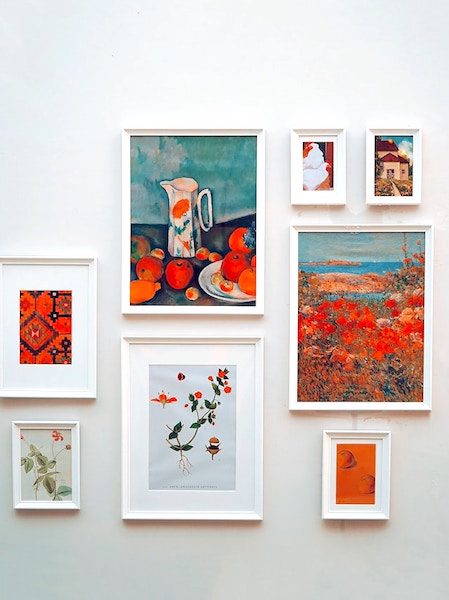
Creating a gallery wall is a fantastic way to mix sizes. Choose a variety of small and medium pieces. Arrange them in clusters to draw attention.
Small Artwork Placement
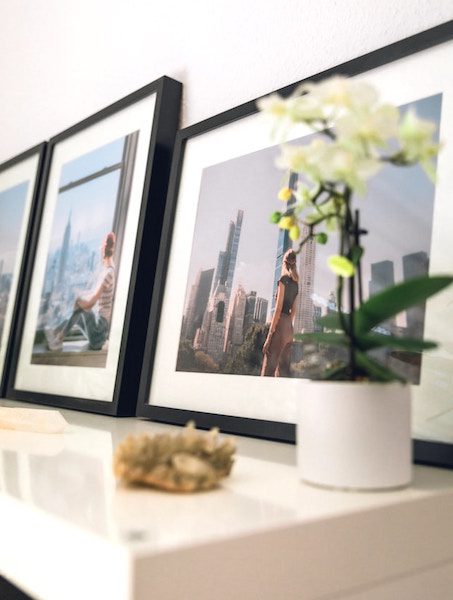
Strategically place small artworks on shelves or countertops. They create unique visual interest without crowding smaller rooms.
Choose the Right Frame and Matting for Your Art and Wall
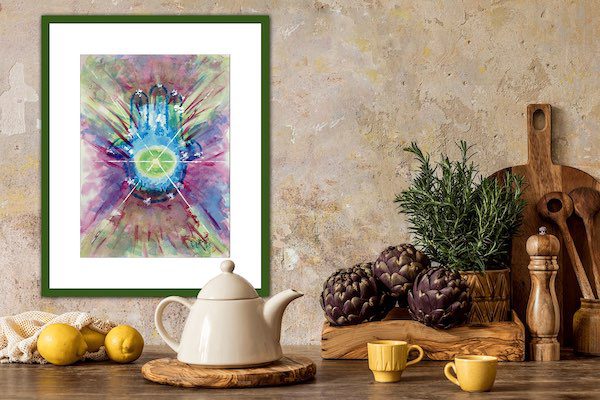
Frame Size and Style
The right frame can enhance or diminish the artwork’s visual impact. A wide, ornate frame adds drama, while a sleek frame keeps it minimalist. Choose a style that complements the art and room decor.
Matting Affects the Overall Size of the Art
Matting significantly impacts presentation. For some types of art, like watercolor and pastel, a mat is a must. A mat not only protects the artwork from the frame cover, but also provides breathing space for the artwork, making it appear larger. That’s why I package my artwork with a white mat, which is a neutral color that goes well with any wall.
Impact on Overall Dimensions
When selecting art, consider the frame and matting in total dimensions. Standard frames come in sizes like 12×16, 16×20, 18×24, or 24×36, not including the width of the frame itself. Knowing how these sizes affect your wall placement is crucial.
Common Mistakes to Avoid
Choosing Art That’s Too Small
Small art gets lost on a large wall. This creates a feeling of emptiness and diminishes the piece’s impact. For instance, a tiny print over a large sofa can feel dwarfed rather than complemented.
Overwhelming the Space with Oversized Art
Conversely, oversized art clutters a room. This makes spaces feel cramped. An enormous canvas in a small dining nook may overpower the atmosphere, leading to distraction from the overall decor.
Ignoring the Room’s Architecture and Style
Art should enhance a room’s architecture. Mismatched art disrupts harmony. For example, modern art in a traditional room may clash and feel out of place. Look for pieces that resonate with the room’s overall design.
Conclusion: How to Choose the Right Size Wall Art
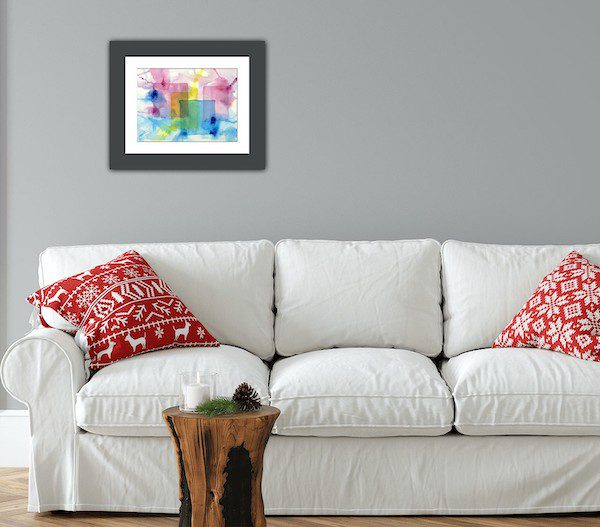
How to choose the right size wall art for your living space is all about considering size, style, and placement. Accurate measurements and understanding your room’s dynamics are key. Avoid mistakes like opting for pieces that are either too small or too large. Start measuring your walls and applying these tips to create a transformative atmosphere. Remember, the right size artwork can elevate your space and reflect your unique style. Thanks for reading!
How to Frame Art – a guide for the beginning art buyer
Discover more from Rhonda Roth Art
Subscribe to get the latest posts sent to your email.